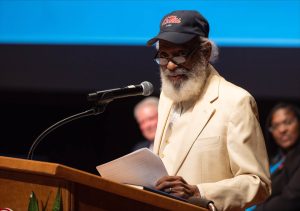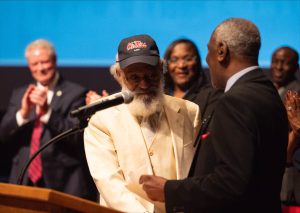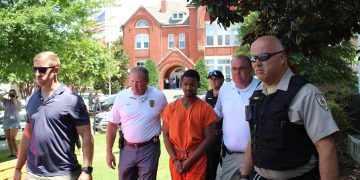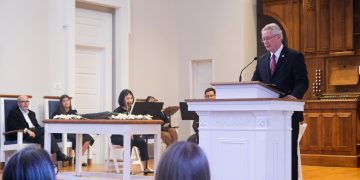
The University of Mississippi held a ceremony to commemorate 60 years of integration on Sept. 28 in the Gertrude C. Ford Center for the Performing Arts. “The Mission Continues: Building Upon the Legacy” recognized James Meredith for his acts of bravery as the first African American to enroll at the university in 1962.
“In my opinion, this is the best day I ever lived,” Meredith said.
During the ceremony, Meredith introduced the audience to the James Meredith Bible Society and how he hopes to raise money for the project. In his eyes, learning about God and the Bible will help us all better ourselves.
“If we don’t start talking about the Bible and moral character, we’re in deep trouble,” he said.
Another big talking point for Meredith: the Black woman. According to Meredith, Mississippi needs the Black woman to successfully operate.
“Nothing in Mississippi can operate without the Black woman, no bank, no grocery store, no restaurant, no public school, no church,” Meredith said. “There’s nothing in Mississippi that God, Jesus Christ and the Black woman cannot fix.”

Praise for Meredith and his actions in 1962 echoed throughout the Ford Center, with appearances from many notable guests, including at least one U.S. Marshal who protected Meredith during the integration.
Donald Cole, UM assistant provost and assistant to the chancellor for multicultural affairs, introduced Meredith, expressing how Meredith was able to “open the doors to a closed society” and make education at the university accessible to the thousands of Black students that would follow in his footsteps.
“He helped us to become a great American public university, and it’s not uncommon today to see James wearing his Ole Miss cap, as he’s still proud of his alma mater,” Cole said.
Dean of the Sally McDonnell Barksdale Honors College Ethel Young Scurlock spoke about her quest to understand Meredith’s struggle to integrate the university, coming to the conclusion that she’d never actually understand.
“As I dug into this history trying to understand the walk that Meredith walked and what it felt like to sit where he sat, it became incandescently clear to me that I will never understand the multilayered battle that James Meredith had to fight publicly and privately to open the doors of this institution,” Scurlock said.
She recognizes that this fight was much more difficult than most people will ever be able to fathom.
“Meredith’s fight was much more complex than anything we can capture on a bronze statue with the words courage, knowledge, opportunity and perseverance,” she said.
Discussing Meredith being shot as he marched along U.S. Highway 51 in 1966 to call attention to voter discrimination, Scurlock spoke about how the many Black faculty, staff and students at the university understand their assignment to make this university more accessible to Black students in the future.
“Mr. Meredith, I was not yet alive when you integrated the University of Mississippi. I was not yet born when you marched against fear. I was not there to help you out of the gravel of Highway 51,” Scurlock said. “But Mr. Meredith, I am here today. I am the unborn baby that you were willing to go to war for. And I am now a grown woman, one of those Christian, over the age of 30 Black women standing with you — grounding in this gravel, this grit, this ground we call Mississippi.”
A multitude of honors and awards were given to Meredith during the ceremony. He was named an honorary Deputy U.S. Marshal. The City of Oxford declared Oct. 1 as James Meredith Day.
The College of Liberal Arts announced the creation of the James Meredith Changemaker Award. The Black Faculty and Staff Organization and the Black Student Union presented Meredith with awards. The Associated Student Body, BSU and the Graduate Student Council led an effort to present Letters to Meredith, a book that included nearly 100 letters from university students.
The establishment of the James Meredith Speaker Series, the James H. Meredith Legacy Scholarship and the James H. Meredith Legacy Award by the university were announced.
The university also presented Meredith with the University of Mississippi Humanitarian Award, a distinguished award that has only been given four times in over two decades, according to Chancellor Glenn Boyce. The university also pledged a monetary award for the James Meredith Bible Society.
“This award recognizes and celebrates remarkable individuals whose extraordinary leadership and advocacy have withstood the test of time,” Boyce said. “Throughout this marvelous evening, one thing is clear: James Meredith’s legacy will continue to shape our university, the state of Mississippi and this country forever.”


























